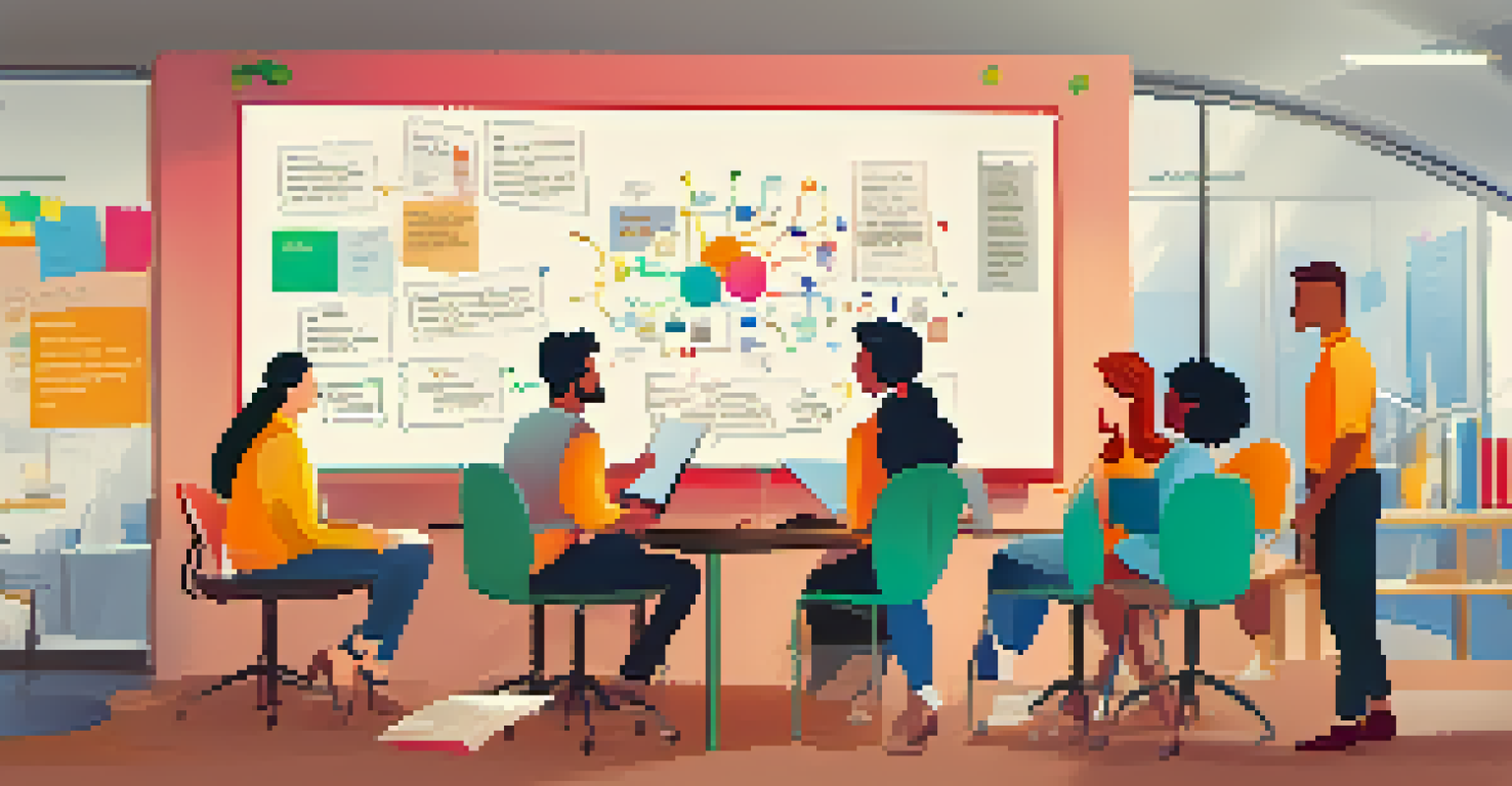Strategies for Improving Critical Thinking in Employees

Understanding Critical Thinking and Its Importance
Critical thinking is the ability to analyze information objectively and make reasoned judgments. In the workplace, this skill is vital as it enables employees to solve problems effectively and make informed decisions. By fostering a culture of critical thinking, organizations can enhance innovation and adaptability among their teams.
Critical thinking is the key to creativity and innovation.
Employees equipped with strong critical thinking skills can assess situations from multiple angles, leading to better conclusions and solutions. This not only improves individual performance but also contributes to the overall success of the organization. Moreover, critical thinking helps in navigating complex challenges that arise in today's fast-paced business environment.
In essence, promoting critical thinking is not just about individual growth; it's about creating a resilient workforce that can respond to change and uncertainty. Organizations that prioritize this skill set are more likely to thrive and maintain a competitive edge in their industries.
Encouraging Open Communication Among Employees
Open communication is the foundation of critical thinking. When employees feel comfortable sharing their ideas and concerns, it fosters a collaborative environment that nurtures innovative thinking. Encouraging dialogue can lead to diverse perspectives, which are essential for comprehensive problem-solving.

To promote open communication, leaders should create safe spaces for discussions, such as regular brainstorming sessions or feedback forums. This approach not only empowers employees but also signals that their opinions matter, thus enhancing their engagement and investment in the organization’s goals. It's about cultivating a culture where every voice is valued.
Importance of Critical Thinking
Critical thinking enables employees to make informed decisions and solve problems effectively, contributing to overall organizational success.
By making communication a priority, organizations can unlock a wealth of ideas and insights that might otherwise go untapped. This collaborative spirit ultimately leads to stronger decision-making and a more dynamic workplace.
Implementing Problem-Solving Workshops
Problem-solving workshops are a practical way to enhance critical thinking skills. These interactive sessions provide employees with hands-on experience in tackling real-world challenges, allowing them to practice analytical techniques in a supportive setting. By working together, employees can learn from each other's problem-solving approaches.
Diversity is the one true thing we all have in common. Celebrate it every day.
During these workshops, facilitators can introduce various frameworks and tools that aid in critical thinking, such as the SWOT analysis or the Six Thinking Hats method. These methods encourage participants to explore different angles of a problem, leading to more well-rounded solutions. Engaging in simulated scenarios can also boost confidence in their decision-making abilities.
Ultimately, workshops not only improve skills but also strengthen team bonds. Employees who collaborate on challenges are more likely to feel connected, which can enhance overall morale and productivity within the organization.
Encouraging Diverse Perspectives through Team Diversity
Diversity in teams can significantly enhance critical thinking. When employees from various backgrounds come together, they bring unique viewpoints and experiences that enrich discussions and decision-making processes. This diversity of thought is crucial for generating creative solutions to complex problems.
To encourage diverse perspectives, organizations should actively seek to build teams with varied backgrounds, skills, and experiences. This might involve recruiting from different demographics or providing training that promotes inclusivity. When employees feel that their backgrounds are respected and valued, they are more likely to contribute actively to team discussions.
Fostering Open Communication
Encouraging open communication among employees nurtures collaboration and diverse perspectives, essential for innovative problem-solving.
By championing diversity, organizations not only improve critical thinking but also foster an inclusive culture that attracts top talent. A workplace that celebrates differences is one where innovative ideas flourish, leading to greater success.
Utilizing Real-World Scenarios for Training
Training sessions that incorporate real-world scenarios can significantly enhance critical thinking skills. By presenting employees with actual case studies or challenges faced by the organization, they learn to apply their analytical skills in a practical context. This hands-on approach makes the learning experience more relevant and impactful.
Employees can work in groups to analyze these scenarios, encouraging discussion and collaboration. This not only sharpens their critical thinking but also helps them understand the complexities of real-world decision-making. The more they practice with real situations, the more confident they become in their abilities.
Ultimately, this strategy prepares employees to tackle challenges effectively, ensuring they are ready to think critically when faced with unexpected situations in their daily work.
Fostering a Culture of Continuous Learning
A culture of continuous learning encourages employees to enhance their critical thinking skills consistently. Providing opportunities for professional development, such as workshops, online courses, or mentorship programs, helps employees grow and refine their analytical abilities. When learning is prioritized, employees feel empowered to seek out new knowledge and perspectives.
Encouraging a growth mindset is key to fostering this culture. Leaders can promote this by recognizing and rewarding efforts to learn and improve, rather than solely focusing on outcomes. This approach creates an environment where employees are more willing to take risks and explore innovative ideas without the fear of failure.
Continuous Learning Culture
A culture of continuous learning empowers employees to refine their critical thinking skills, making them more adaptable in a changing business landscape.
In a continuous learning culture, critical thinking becomes an integral part of the organizational ethos. Employees not only become better thinkers but also more adaptable and open-minded, traits that are invaluable in today’s ever-changing business landscape.
Evaluating and Providing Constructive Feedback
Regular evaluation and constructive feedback are crucial for developing critical thinking skills. By assessing employees’ thought processes and decision-making, leaders can identify areas for improvement and provide tailored guidance. This feedback loop helps employees understand their strengths and areas where they can grow.
Leaders should focus on providing specific, actionable feedback that encourages reflection and growth. Instead of merely critiquing outcomes, it’s beneficial to discuss the reasoning behind decisions. This approach not only helps employees learn from their experiences but also reinforces the importance of thoughtful analysis.

As employees receive ongoing feedback, they become more aware of their critical thinking processes, leading to continuous improvement. This practice ensures that critical thinking is not just a one-time training exercise but a vital skill cultivated over time.
Celebrating Successes and Learning from Failures
Celebrating successes and learning from failures are essential components of a healthy learning environment. Recognizing achievements reinforces the value of critical thinking and motivates employees to continue honing their skills. When employees see that their thoughtful contributions lead to positive outcomes, it fosters a sense of pride and ownership.
Conversely, analyzing failures provides valuable learning opportunities. Instead of placing blame, organizations should encourage discussions about what went wrong and how different approaches might lead to better results in the future. This reflective practice helps employees refine their critical thinking and decision-making processes.
By creating an environment where both successes and failures are acknowledged, organizations can promote a culture of resilience and continuous improvement. This balance ensures that critical thinking remains a dynamic and essential skill within the workforce.